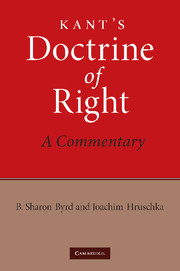Book contents
- Frontmatter
- Contents
- Introduction and methods of interpretation
- Chapter 1 The idea of the juridical state and the postulate of public law
- Chapter 2 The state of nature and the three leges
- Appendix to Chapter 2 Iustitia tutatrix, iustitia commutativa, and iustitia distributiva and their differences
- Chapter 3 The right to freedom
- Chapter 4 The permissive law in the Doctrine of Right
- Chapter 5 The external mine and thine
- Chapter 6 Intelligible possession of land
- Chapter 7 The “state in the idea”
- Chapter 8 The state in reality
- Chapter 9 International and cosmopolitan law
- Chapter 10 The “idea of public law” and its limits
- Chapter 11 Contract law I. Why must I keep my promise?
- Chapter 12 Contract law II. Kant's table of contracts
- Chapter 13 Criminal punishment
- Chapter 14 The human being as a person
- Appendix I to Chapter 14 On the logic of “‘ought’ implies ‘can’”
- Appendix II to Chapter 14 The system of rules of imputation
- Bibliography
- Index
Chapter 4 - The permissive law in the Doctrine of Right
Published online by Cambridge University Press: 05 June 2012
- Frontmatter
- Contents
- Introduction and methods of interpretation
- Chapter 1 The idea of the juridical state and the postulate of public law
- Chapter 2 The state of nature and the three leges
- Appendix to Chapter 2 Iustitia tutatrix, iustitia commutativa, and iustitia distributiva and their differences
- Chapter 3 The right to freedom
- Chapter 4 The permissive law in the Doctrine of Right
- Chapter 5 The external mine and thine
- Chapter 6 Intelligible possession of land
- Chapter 7 The “state in the idea”
- Chapter 8 The state in reality
- Chapter 9 International and cosmopolitan law
- Chapter 10 The “idea of public law” and its limits
- Chapter 11 Contract law I. Why must I keep my promise?
- Chapter 12 Contract law II. Kant's table of contracts
- Chapter 13 Criminal punishment
- Chapter 14 The human being as a person
- Appendix I to Chapter 14 On the logic of “‘ought’ implies ‘can’”
- Appendix II to Chapter 14 The system of rules of imputation
- Bibliography
- Index
Summary
The basis for extending our external freedom to include what Kant calls the “external mine and thine” is the permissive law of practical reason. Kant postulates this law in §2 of the Doctrine of Right. The law gives us a moral faculty or authorization to be the owners of physical things, claimants under a contract, holders of family rights. Kant postulates the permissive law because he says it cannot be derived from pure principles of right. Without it we would have the original right to external freedom of choice, but no right to have an external object as our own.
This chapter first examines two different concepts of a permissive law (section 1). These two concepts evolve out of two distinct meanings of the word “permitted.” Kant distinguishes these two meanings of permitted, and bases his permissive law in the Doctrine of Right on the narrower meaning, which he calls “merely permitted” (bloß erlaubt). That the permissive law in the Doctrine of Right is based on the narrower meaning “merely permitted” has not been understood in Kant interpretations. That is because Kant also discusses permissive laws in his earlier Perpetual Peace, basing them there on the broader meaning of the word “permitted.” Kant scholars have focused on the meaning of permitted in Perpetual Peace and not in the Doctrine of Right. Under the broader meaning of permitted, a permissive law is similar to a justification to commit an otherwise prohibited act.
- Type
- Chapter
- Information
- Kant's Doctrine of RightA Commentary, pp. 94 - 106Publisher: Cambridge University PressPrint publication year: 2010



